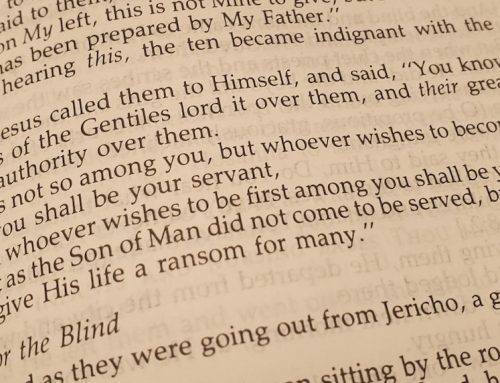Note: The “a-ha” moment I describe in Turning the Tables on Legalism about what it would feel like to receive legalistic love from my kids first clicked in my mind regarding marriage. This article is the true story of when I first made that connection.
I’m thankful for the love of my wife, in part because she exhibits her love for me in ways I neither deserve nor ask for. That makes me feel privileged and honored to be her husband. I know without a doubt that I have her loyalty and affections.
I could argue that most everything good in my life flows from the fact that I feel such security in our relationship. That’s because love is inherently inspiring, motivating, and empowering, whether it’s poured out by God himself, or through the loving actions of my friends, my family, or my wife. This prompted an inspiring thought: The reason my wife knows how to love as well as she does is that love comes from God, and everyone who loves is born of God. I guess she learns from the best.
So in the middle of thanking God one night for the love of my wife, my thoughts wandered down a neat little road. Prayer unfinished, this powerful idea consumed me. If she learned how to love from God, who is the definition of love, then as the recipient of her love, what if I could learn something about how God wants to be loved?
It immediately dawned on me that love stands in stark contrast to legalism. What if my wife was a legalist in her desire to please me? What if her goal in life was to try to “follow my commands,” and she nervously wondered if she had succeeded or angered me every day? What if she refused to do anything for me that I didn’t clearly, specifically ask for? What a drag that would be! That would totally remove heartfelt spontaneity from the relationship, wouldn’t it?
I could speculate that if she loved me legalistically, wanting only to follow all my commands precisely, at least I’d know her intentions were good. But really, that may not even be the case. What if she wanted to “follow all my commands” just so she could get something she wanted out of the relationship? I’d sort of feel used, I think.
Perhaps I could rationalize that at least she doesn’t want to anger me by doing something I might not like. But the feeling I’d be left with at the end of each day would be a bit cold and empty. Don’t I do plenty of good things for her that she doesn’t expect or request? Why doesn’t she want do the same for me? Am I really so volatile that she thinks I’m going to blow up if she misunderstands my desires?
I pondered the implications of such a legalistic marriage. Besides feeling very unloving—maybe even a little like a tyrant—I wouldn’t feel nearly as loved, either. If she loved me legalistically, her actions, I realized, would seem hollow and lifeless to me. I might not even want her gifts at all if I thought they were just intended to be checked off her list, and were really all about getting what she wanted from me. My mind racing and my prayer long forgotten, the obvious truth sank in. If I don’t want a legalistic love from my wife, why would God want that from me?
You see, the need to be loved is part of the human condition, so all of us who have experienced love are capable of some insight into how God wants to be loved, whether we know and acknowledge our Creator or not. When we are loved with abandon—and I mean truly loved, not just complied with—isn’t it true that we must feel something like God must feel when he is loved with abandon? The Golden Rule perhaps becomes the Platinum Rule, vividly three dimensional, in this light. We should love God like we want to be loved by others.
This is truly exciting, isn’t it? It means we as humans can feel how God feels when he is (or is not) loved from the heart. Weren’t we crafted in his likeness? Isn’t divine empathy the basis for Jesus’ coming to earth to live like one of his creation? Our relationship with The Divine is framed in scripture with rich metaphors based on human relationships we can understand much better: God is not only said to be our God, but our father, brother, spouse, and friend.
It’s no surprise, then, that our divine relationship can be impaired with our all-too-human relationship problems. Imagine a marriage where neither partner will bless the other with an act of love unless it has been clearly and specifically requested. Or a son who is so fearful of doing the wrong thing, and receiving his father’s wrath, that he feels it’s safer to do nothing to try to please his father. Sadly, I’ve approached God in that way, and perhaps you have, too.
Kids, by contrast, do things of their own accord to express their love for us. (I suspect that’s why Jesus told us to be more like children.) One day, I came home to see posters taped all over the house with artwork and notes of appreciation. They had honored me by christening the day “D.A.D.” (Dad Appreciation Day). Just think how I could have crushed my kids if I had been angry at them for this attempt to honor me like this. Worse, how would I feel if my children lived in fear of honoring me so spontaneously? Instead, their love comes across as more genuine to me when they express it from their own hearts, rather than simply “command-following.” Our service to God must be so much more appreciated when our lives overflow with it from our own hearts.
After all, aren’t acts of love most meaningful when they come without being commanded, or even specified? How many times have husbands heard their wives say “It doesn’t mean as much because I had to ask you to do it?” By merely seeking to obey God’s commands, I realize now that I have been guilty of cheapening love. I have taken the very simple concept of godly love that even children understand, and made it into something so conditioned by rules, regulations and exceptions, that its divine nature has become unrecognizable.
In this moment of clarity, I suddenly understood why Jesus and the New Testament writers were so unwilling to provide a list of all the commands we needed to follow in order to please God. Christianity isn’t a sick joke—God’s little obstacle course for us, to make us decipher all the rules before we can follow them—because it’s not the command-following at all that he wants, but our hearts.
Under the New Covenant, where God’s laws are to be written on our hearts, God is most honored by freewill offerings of love from the heart, not our lawyerly attempts to do what our feeble intellect says that God wants, using legal precedents of “command, example, and necessary inference.” Thankfully, the legal framework of the Old Covenant, which involved a lengthy and complex body of laws and exceptions, was nailed to the cross. I don’t want my wife to show her love to me by complying with a list of demands any more than God wants that from me.
Here’s the cool part. As I better appreciate my wife’s heartfelt expressions of love for me, I find myself desiring to lift her up and bless her with every ounce of my being. Then another sacred thought dawns on me: I desire to do for her, in response to her heartfelt love, what God desires to do for me in response to mine. Wow. This “love” topic just gets deeper and deeper, doesn’t it? No wonder love is the greatest.
1 John 4:7 – Dear friends, let us love one another, for love comes from God. Everyone who loves has been born of God and knows God.






Wow !…The Creator is so knowable !!…thank you Kevin for being so sensitive to the Spirit…please, people, just keep loving ( and praying for ) those we know are in deep religious bondage so the light of love can open the minds of those who will be delivered. M.F.Welch
HEY Ducky!